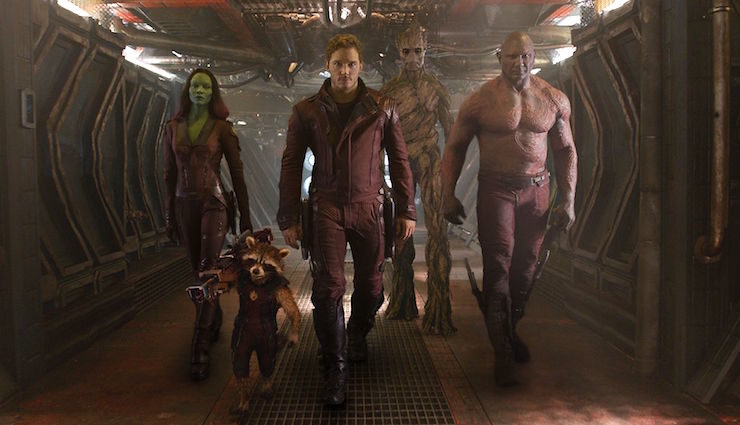There’s a moment towards the end of classic British sitcom Spaced where Simon Pegg’s character, Tim Bisley, pleads with his landlady for forgiveness. The eventual scene where she forgives him, this being Spaced, involves a tank—but the first time Tim tries it, there’s one line that really strikes you, a line that’s repeated a few times in the final episode:
“They say the family of the twenty-first century is made up of friends, not relatives….”
Tim could have been talking about the Guardians of the Galaxy. (In fact, I like to think he probably is talking about them, right now, somewhere just off Meteor Street.) Guardians of the Galaxy may not be strictly a family film, but it’s one defined by family. The first two scenes alone set the stage as young Peter Quill, horrified and grief-stricken, refuses to see his dying mother for the last time. It’s a gut-wrenching moment, the last possible thing you’d expect at the start of an ostensible action-comedy superhero movie, and absolutely the opposite of every single opening scene we’ve seen in a Marvel movie. It shocks you, wakes you up, and is followed by a gear change that’s even more drastic.
We cut from a horrified Peter running from his mother directly into a UFO abduction to Peter as an adult. Dancing to classic American pop tunes on a reconfigured Walkman, he playfully grooves and struts his way across an alien landscape, steals an impossibly powerful object, and is nonplussed when his foes fails to recognize him (even when he smugly identifies himself as “Star-Lord”). Peter the terrified child has become Peter the joyously rumpled, morally questionable man-child.
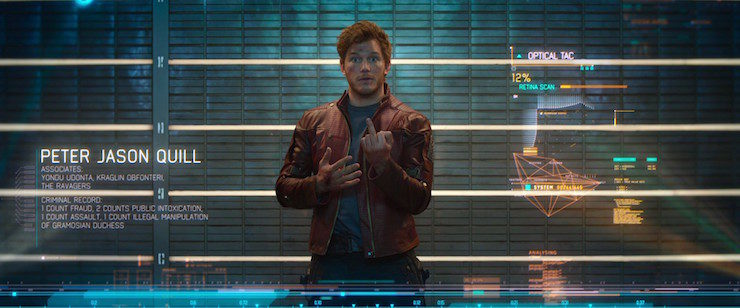
His journey through the movie drives this home at every opportunity. Peter Quill is Peter Pan with jet boots, brought up by the worst possible people and operating on a shaky ethical framework based partly in the code of the space pirates who raised him and partly in the Earth culture he’s still able to remember. It’s particularly significant that while he hasn’t opened the present from his mom in twenty years, he has carried it with him constantly. Peter is emotionally immature because on some level he’s still expecting to be rescued. He clings to her gift, and to who he used to be, because he’s convinced that if he stays as he is, he’ll never have to face up to the fact that is his mom is really gone.
That leads up to one of the most successful emotional beats in any Marvel movie to date. The gift is, of course, a mix tape and as Quill plays it for the first time, he reads the last words his mother ever wrote to him. The shot of him—sitting on his bed, tears filling his eyes as Gamora silently checks in on him and quietly, just a little, dances—encompasses everything you need to know about these two. Peter has finally walked up to and through the gates at the end of his childhood. He’s raw and hurt and frightened and Gamora, who’s just done the same thing, is there waiting for him. They’re now the designated heads of a newly-forged family, one built out of friendship and choice. A living weapon and a near feral man-child have both officially become adults. Quill being Quill, he’s not great at it right away…but it’s a good start.
Quill’s new family have all experienced equally interesting (and troubled) journeys to get to this moment. Gamora in particular has far more agency on a second viewing than it might seem at first glance. Like Quill, she was taken against her will and, like Quill, she’s been changed forever by the people who took her and raised her. However, where Quill got some nice red leather duds and endearingly mutable morals, Gamora got a lifetime of combat enhancements, wounds of every imaginable sort, an upbringing that would make the Spartans recoil, and a reputation as one of the galaxy’s most prolific murderers.
And she refuses to let it break her.
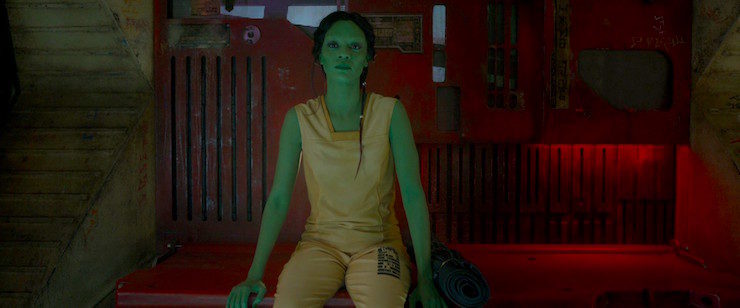
Where Quill more or less cheerfully embraces the lifestyle of his captors, Gamora never entirely gives in. She lives her entire life as a weapon of Thanos but never once lets him corrupt her fully. She’s constantly working in the background, constantly planning her escape, and there’s a strong case to made that a prequel movie focused on her past, filling out her backstory more fully and leading up to her first appearance in Guardians, would be at least as interesting as the one we got.
It’s also crucial to note that she’s also the first member of the Guardians to express the importance of defending the stone. Gamora is principled in a way that none of the others, with the possible exception of Groot, quite are—she has a lifetime of hard, mostly bad decisions behind her, ones she had no choice but to make. Given the opportunity to turn that around, and (as she says) to die with friends, she embraces it completely.
An unmistakable angry, sharp-edged compassion is ultimately what drives and defines her. She’s clearly painfully aware of the damage, real and emotional, she’s done to her sister and is desperate to save her. She’s also clearly walled herself from the guilt of the crimes she’s committed in Thanos’ name. But, again, somehow, Gamora uses that guilt as a foundation for a surprisingly solid moral framework. You can’t help but feel she may be the Guardian who’d get on best with Steve Rogers. They’re both old soldiers who’ve done things they’re still struggling to make peace with, after all.
That’s why, along with Quill, she forms the heart of the family: two broken people who’ve repaired themselves on their own terms, making a new life out of the wreckage of their old ones. No wonder their emotional bond is so strong, even if Peter still managed to do at least one stupid thing an hour.
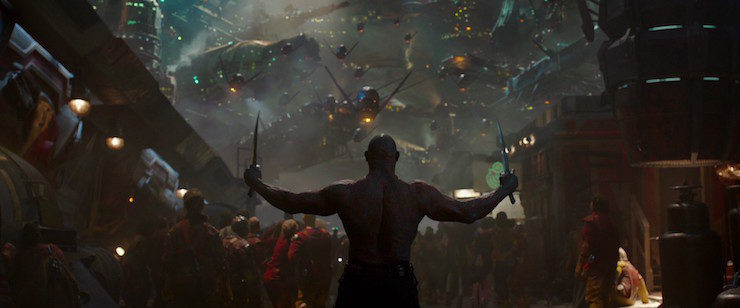
Drax, for his part, comes to the family with the most to gain and nothing whatsoever to lose. He’s a warrior and a failed one at that, a man who lost his family because he wasn’t there to protect them, which is both the most familiar, trope-riddled origin story of the entire group and the starting point for one of the movie’s most interesting characters. Dave Bautista’s take on Drax is a perfectly balanced combination of incredible physical presence and colossal emotional honesty. The moment where he belly laughs uncontrollably during a crash landing shows just how much more there is to him besides his impressive bulk. The fact that he’s seeking a good and honorable death, but can maybe wait around a while before really embracing it, makes him even more endearing. Drax starts the movie as an utterly off-the-shelf doomed warrior type. He finishes it as something far more complicated, interesting and sympathetic.
Which brings us to the two biggest outcasts in the group. Rocket is the furthest from home, the most alienated. The only one of his species to be altered to have intelligence, the smartest person in the room, and robbed even of the knowledge of his own origins, it’s no wonder that Rocket is so furious. He’s impatient with everyone and everything and trusts exactly one and a half people: himself and Groot. Despite this, and his own reluctance to sign up at the end, Rocket embraces not one but three extended families in Guardians of the Galaxy. He’s devastated when the Nova Corps fall, stands with the Ravagers without a second’s hesitation, and puts his own crushing grief aside to assist in defeating Ronan. Rocket may be the furthest one from home, but he’s also the one who seems to recognize most keenly that he needs the group…or at the very least, that he needs Groot and Groot needs the group.
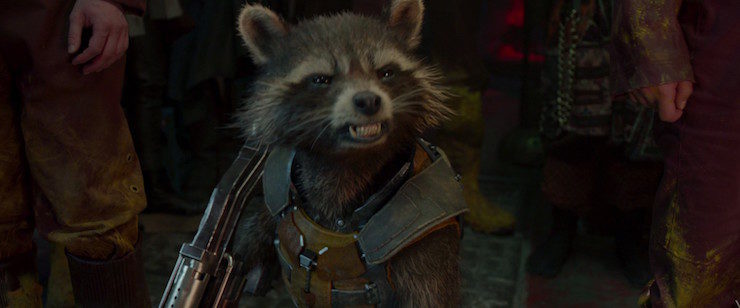
And finally, there’s Groot. The expressive, gentle, terrifying sentient tree clearly has a rich inner life that he balances with a willingness to connect that none of the others share (at least in the beginning). Groot is at peace in his world, happy being a part of it in a way that no one else is. That fundamental kindness and peaceful self-confidence is a key ingredient of the glue that eventually holds the team together, and Groot’s quiet, direct approach gives the film many of its best jokes and sweetest moments. It’s also what leads to the movie’s most touching moment. “We are Groot” has such weight, conveying everything that needs to be said in a single, simple phrase—and without this moment it’s hard to believe the characters would have the strength to face down Ronan at the end.
The Guardians of the Galaxy don’t so much jest about their scars as they play them off and refuse to recognize the extent of their damage. Not a single one of them is a functional individual and together they make a gloriously, raucously dysfunctional whole. But it’s precisely that damage that ties these five misfits together: a lost and abandoned boy finally facing his past, a super assassin looking for redemption, a warrior with a Quixotic journey ahead of him, a surgically-mutated engineering genius, and Groot. They bicker and fight not just because they don’t get on but because that how they express their love for each other. That, and they also really, REALLY like arguing.
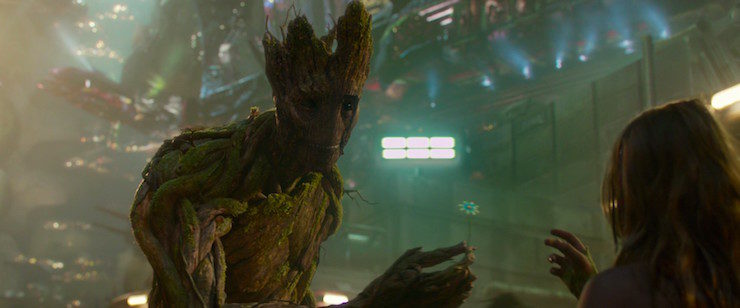
Friends, the Guardians of the Galaxy, a bunch of a-holes…call them what you want. But don’t underestimate the bonds that hold this deeply weird, hilariously dysfunctional, and surprisingly close family together. And don’t ever let them trick you into a dance off.
Alasdair Stuart is a freelancer writer, RPG writer and podcaster. He owns Escape Artists, who publish the short fiction podcasts Escape Pod, Pseudopod, Podcastle, Cast of Wonders, and the magazine Mothership Zeta. He blogs enthusiastically about pop culture, cooking and exercise at Alasdairstuart.com, and tweets @AlasdairStuart.










